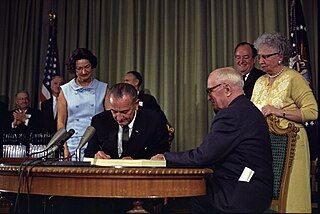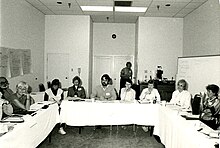Cancer support groups are meetings that offer a safe space for people affected by cancer to share their experiences and emotions with other people who have cancer. People in stressful situations benefit from having a good social support system, and a cancer support group can be part of a support system.

A cancer survivor is a person with cancer of any type who is still living. Whether a person becomes a survivor at the time of diagnosis or after completing treatment, whether people who are actively dying are considered survivors, and whether healthy friends and family members of the cancer patient are also considered survivors, varies from group to group. Some people who have been diagnosed with cancer reject the term survivor or disagree with some definitions of it.
In the healthcare industry, pay for performance (P4P), also known as "value-based purchasing", is a payment model that offers financial incentives to physicians, hospitals, medical groups, and other healthcare providers for meeting certain performance measures. Clinical outcomes, such as longer survival, are difficult to measure, so pay for performance systems usually evaluate process quality and efficiency, such as measuring blood pressure, lowering blood pressure, or counseling patients to stop smoking. This model also penalizes health care providers for poor outcomes, medical errors, or increased costs. Integrated delivery systems where insurers and providers share in the cost are intended to help align incentives for value-based care.
Health advocacy or health activism encompasses direct service to the individual or family as well as activities that promote health and access to health care in communities and the larger public. Advocates support and promote the rights of the patient in the health care arena, help build capacity to improve community health and enhance health policy initiatives focused on available, safe and quality care. Health advocates are best suited to address the challenge of patient-centered care in our complex healthcare system. The Institute of Medicine (IOM) defines patient-centered care as: Health care that establishes a partnership among practitioners, patients, and their families to ensure that decisions respect patients’ wants, needs, and preferences and that patients have the education and support they need to make decisions and participate in their own care. Patient-centered care is also one of the overreaching goals of health advocacy, in addition to safer medical systems, and greater patient involvement in healthcare delivery and design.
Patient advocacy is a process in health care concerned with advocacy for patients, survivors, and caregivers. The patient advocate may be an individual or an organization, concerned with healthcare standards or with one specific group of disorders. The terms patient advocate and patient advocacy can refer both to individual advocates providing services that organizations also provide, and to organizations whose functions extend to individual patients. Some patient advocates are independent and some work for the organizations that are directly responsible for the patient's care.

The philosophy of healthcare is the study of the ethics, processes, and people which constitute the maintenance of health for human beings. For the most part, however, the philosophy of healthcare is best approached as an indelible component of human social structures. That is, the societal institution of healthcare can be seen as a necessary phenomenon of human civilization whereby an individual continually seeks to improve, mend, and alter the overall nature and quality of their life. This perennial concern is especially prominent in modern political liberalism, wherein health has been understood as the foundational good necessary for public life.
The National Quality Cancer Care Demonstration Project Act of 2009 is an initiative intended to enhance the quality of cancer care i the United States, focused on seniors covered by Medicare, while also controlling costs. House bill H.R. 3675 was introduced by Congressman Artur Davis (D-AL) and cosponsored by Representatives Mary Jo Kilroy (D-OH), Steve Israel (D-NY), Joe Courtney (D-CT) and Adam Schiff (D-CA).
An accountable care organization (ACO) is a healthcare organization that ties provider reimbursements to quality metrics and reductions in the cost of care. ACOs in the United States are formed from a group of coordinated health-care practitioners. They use alternative payment models, normally, capitation. The organization is accountable to patients and third-party payers for the quality, appropriateness and efficiency of the health care provided. According to the Centers for Medicare and Medicaid Services, an ACO is "an organization of health care practitioners that agrees to be accountable for the quality, cost, and overall care of Medicare beneficiaries who are enrolled in the traditional fee-for-service program who are assigned to it".
The Pancreatic Cancer Action Network (PanCAN) is a United States-based 501(c)(3) charity that funds research, provides patient/caregiver support, conducts community outreach and advocates for increased federal research funding for those affected by pancreatic cancer.
The Cancer Support Community (CSC) focuses on three areas of support: direct service delivery, research, and advocacy.

Childhood cancer is cancer in a child. About 80% of childhood cancer cases in high-income countries, can be successfully treated thanks to modern medical treatments and optimal patient care. However, only about 10% of children diagnosed with cancer reside in high-income countries where the necessary treatments and care is available. Childhood cancer represents only about 1% of all types of cancers diagnosed in children and adults. For this reason, childhood cancer is often ignored in control planning, contributing to the burden of missed opportunities for its diagnoses and management in countries that are low- and mid-income.
Ovarian Cancer Research Alliance (OCRA) is a not-for-profit organization focused on ovarian cancer research, advocacy and patient support. The organization was formed in January 2016 when the former not-for-profit organization Ovarian Cancer Research Fund, which focused primarily on ovarian cancer research, combined with Ovarian Cancer National Alliance, which focused primarily on ovarian cancer advocacy and support programs, to form one organization.
The Oncology Care Model (OCM) is an episode-based payment system developed by the Center for Medicare and Medicaid Innovation. The multipayer model is designed for discrete instances of care, especially those involving chemotherapy, which triggers the six-month episode. The program combines fee-for-service (FFS) payments for established services, monthly payments for additional care under a structured guideline, and performance-based payments weighed against quality metrics and benchmarks.

Anna María Nápoles is an American behavioral epidemiologist and science administrator. She is the Scientific Director of the Intramural Research Program at the National Institute on Minority Health and Health Disparities. She was a professor and epidemiologist at University of California, San Francisco.

Fitzhugh Mullan was an American physician, writer, educator, and social activist. He participated in the founding of the Student Health Organization, the National Coalition for Cancer Survivorship, Seed Global Health, and the Beyond Flexner Alliance. Mullan was a professor of Health Policy and Management and of Pediatrics at the George Washington University and the George Washington University Health Workforce Institute, now renamed the Fitzhugh Mullan Institute for Health Workforce Equity. He was an elected member of the National Academy of Medicine.
Larissa Nekhlyudov is an American general internist. She is a professor of medicine at Harvard Medical School, primary care physician at the Brigham and Women’s Hospital and Clinical Director of Internal Medicine for Cancer Survivors at the Dana–Farber Cancer Institute.
Ann Hart Partridge is an American medical oncologist. She is the founder and director of the Young and Strong Program for Young Women with Breast Cancer at the Susan F. Smith Center for Women's Cancers at the Dana–Farber Cancer Institute.
Patricia Anne Ganz is an American medical oncologist. She is a professor of health policy and management in the Fielding School of Public Health and a professor of medicine in the David Geffen School of Medicine at UCLA. In 2007, she was elected to the Institute of Medicine.

Dana Dornsife is an American entrepreneur, patient-advocate and philanthropist in the areas of health care, education, the environment and social justice. She is the Founder and Chief Mission and Strategy Officer of Lazarex Cancer Foundation, a nationwide non-profit organization that helps advanced-stage cancer patients find and access treatment through Food and Drug Administration clinical trials. Dornsife and her husband, American businessman David H. Dornsife, are philanthropists who have donated hundreds of millions of dollars to charitable causes and were named among the nation’s Top 50 most generous donors in 2016 by The Chronicle of Philanthropy. The couple made the list of America's Top 50 Donors of 2020 as well according to Philanthropy 50, an annual ranking compiled by The Chronicle of Philanthropy. They ranked #27 for giving $59 million.
Raymond Javan Chan is an Australian oncology nurse, clinical trialist, researcher, and senior administrator. He is Matthew Flinders Professor of Cancer Nursing, and Director of the Caring Futures Institute and Dean of Research within the College of Nursing and Health Sciences, Flinders University. He also holds academic titles as NHMRC Investigator Fellow and Matthew Flinders Fellow. He also currently holds an NHMRC Investigator Fellowship.






